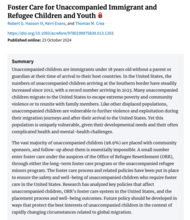Displaying 41 - 50 of 2509
It was 3 a.m. when they got the call. Staff at the Altadena foster care facility had been monitoring the Eaton Fire since it sparked earlier that evening. But the growing flames looked to be moving in the opposite direction, and their location remained well outside the evacuation zone.
This policy brief explores how extended foster care in the U.S.—enabled by the Fostering Connections Act of 2008—can support young people aging out of foster care by providing critical resources and stable living arrangements through Independent Living Programs (ILPs) and Supervised Independent Living Placements (SILPs). It outlines the challenges these youth face, the evolution of related federal policy, and offers recommendations to strengthen support during their transition to adulthood.
Kin and fictive kin involvement can be protective following maltreatment and contribute to the development of children’s strengths. Findings show that support from kin may positively influence strength development for youth in foster care. Professionals in foster care should prioritize kin involvement to enhance support and develop youth strengths.
This study used a quasi-experimental design to evaluate the Transition to Independence Program (TIP) at Wayne State University in Detroit, Michigan, which provides targeted financial aid, concrete supports, academic coaching, and navigation assistance for college students with foster care experience. Findings show TIP participants had significantly higher retention rates than non-participating peers with foster care backgrounds and performed on par with low-income, first-generation students without foster care experience.
In an interview with Time magazine, Donald Trump was asked if would reinstate a policy that separates children of undocumented children from their parents at the southern border. Widely viewed as a cruel and inhumane response to undocumented immigration, the migrant separation policy became one of the most controversial decisions of Trump’s first term. Despite that, the president-elect refused to rule out bringing it back.
Adam Crapser has become something of a cause celebre for what critics say is a flawed United States law that unfairly leaves tens of thousands of international adoptees in limbo without citizenship.
Former President Donald Trump's pledge to implement mass deportation if he's reelected has ignited fears of family separations.
Standing beneath the foothills of the Estrella Mountains near the Gila River Indian Community, President Joe Biden delivered an impassioned, first-ever apology to survivors of Indian boarding schools today, calling the years between 1819 and 1969 shameful and “one of the most horrific chapters in American history.”
This research analyzed key policies that affect unaccompanied children, the Office of Refugee Resettlement (ORR)'s foster care system in the United States, and the placement process and well-being outcomes.
"We cannot do this work alone. The church in the United States of America has led the charge globally to provide solutions to children that no one was willing to care for," says Philip Aspegren, the co-executive director of Casa Viva.


